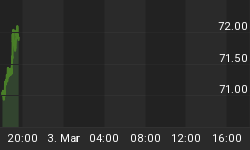"There is no group more subjective than conventional analysts." -- Robert Prechter.
Elliott wavers sometimes hear the criticism that patterns in market charts can be "open to interpretation." For example, what looks like a finished 1-2-3 correction to one analyst, another analyst may interpret as 1-2-3 of a developing impulse, with waves 4 and 5 on the way.
Does this happen? Absolutely. (Although, there are always tools an Elliottician can employ to firm up the wave count.) But here's the real question: What's the alternative?
Typical alternatives amount to analysis of the "fundamentals": Jobs, interest rates, CPI, PPI, what Ben Bernanke said on Tuesday -- it all goes into the pot. Result? Well, if you think it's clear and unambiguous, guess again. Here's a fresh example.
On the evening of February 18, in a surprise move, the Federal Reserve raised its discount rate -- the interest rate at which it lends money to banks. The next morning the S&P futures were pointing lower; everyone was bracing for a weak day -- because, as conventional thinking goes, higher interest rates are bad for business, the economy, and ultimately for the stock market. Friday morning, stocks indeed opened lower and major news headlines confirmed:
- Wall St opens weaker after Fed move
- ... Investors Wary After Fed Move
- Stocks Open Lower After Surprise Fed Move
But around 11am that same morning, the DJIA turned around and moved higher. Now look at what the headlines from major sources were saying after lunch on February 19:
- US stocks bounce back; Fed move viewed in positive light
- US Stocks Up A Bit On Fed Discount Rate Increase
- Stocks Higher After Fed Move
What was a "bearish move" by the Fed in the morning morphed into a "bullish" one by the afternoon! Same event. Same market. Same day. Completely opposite interpretation!
This brings to mind the answer EWI's President Robert Prechter once gave when asked about the objectivity of Elliott wave analysis. Bob said:
"I always ask, 'compared to what?' There is no group more subjective than conventional analysts who look at the same 'fundamental' news event -- a war, the level of interest rates, the P/E ratio, GDP reports, you name it -- and come up with countless opposing conclusions. They generally don't even bother to study the data. Show me a forecasting method that is totally objective or contains no human interpretation. There is no such thing, even in a black box. To answer your question more specifically, though, properly there should be no subjectivity in interpreting Elliott waves patterns. There is a set of rules and guidelines for that interpretation. Interpretation gives you only the most probable scenario(s), not a sure one. But people mislabel probabilistic forecasting as subjectivity. And subjectivity or bias can ruin that value, just as in any other approach. Sometimes we screw up. But in contrast to the outrageously improbable (if not downright false) wave interpretations or other types of forecasts we often see from others, we are as close to an objective service as you're going to find. We hire analysts who know the rules of Elliott cold."
Find out what really moves markets -- download the free 118-page Independent Investor eBook. The Independent Investor eBook shows you exactly what moves markets and what doesn't. You might be surprised to discover it's not the Fed or "surprise" news events. Learn more, and download your free ebook here.
















